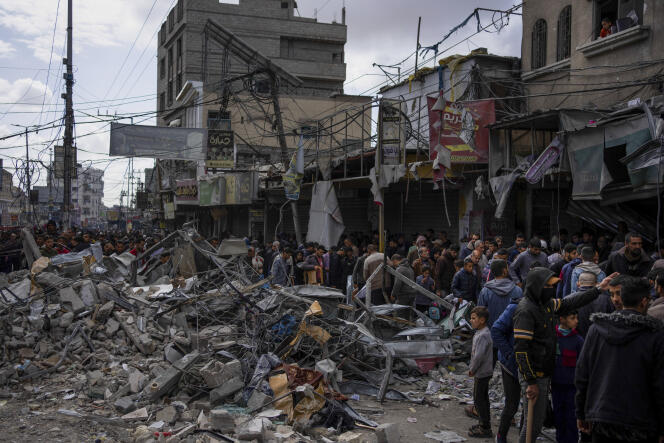
On Sunday, March 3, Ahmad and a few of his neighbors took the risk of going out into their street in Gaza, to clean up the mountains of garbage that no authority had collected for months, and which were filling the air with stench and spreading fears of disease. Hunger was gripping them and monopolizing their rare conversations. Some would eat pancakes made from animal fodder, others tree leaves. However, Ahmad, a young writer and activist, who used an alias for fear of being identified by the Israeli army, was proud of their mutual aid actions.
He was surprised that a semblance of organized collective life was still possible in his city, which Israel had besieged and starved. For almost a month, he has been reporting these paltry efforts to his friends and family in Jerusalem over the phone. To contact them, he would risk exposing himself, by climbing out in the open onto a windy knoll, to his city's north, which overlooks a vast swathe of his neighborhood that has been razed to the ground by Israeli bombs. A few inhabitants gather near huge craters around a poor merchant who, for a few coins, share an Internet connection with them. Using a foreign SIM card inserted into a Wi-Fi device, anyone can open up a window to the outside world for a few minutes.
A staggering power vacuum
Nearly 300,000 inhabitants have been left to fend for themselves in this city, which had a population of over 1 million before the war, and where every form of authority and administration has been crushed. The Israeli army has – for the most part – withdrawn from the city, continuing its operations in the enclave's south. It has reduced the city to a state of hunger and chaos, after destroying or damaging most of the buildings, including administrative centers, ministries, the elegant Ottoman building that housed the mayor's office, the municipal archives, the parliamentary headquarters, and the homes of those senior administrators who had more or less direct ties to Hamas. Many of them were killed or arrested as they fled to the enclave's south. The infrastructure has been ravaged. Water pipes have been torn up by army excavators, as has the asphalt on the streets. The electricity network is shut down and in tatters.
This inventory is highly incomplete. The World Bank has assessed the level of destruction based on satellite images, with little precision. The Palestinian public works ministry in Ramallah had been cataloging them in greater detail until December. It has now thrown in the towel: "We no longer have any contacts in Gaza: They're too busy looking for anything to eat," said Deputy Minister Duqan Al-Atawneh. Only Gaza's health ministry has maintained daily contact with Ramallah. It has been assisting the few remaining Gaza hospital staff and counting the dead – over 30,000.
You have 73.48% of this article left to read. The rest is for subscribers only.